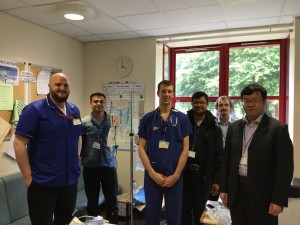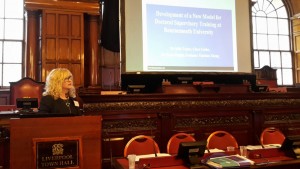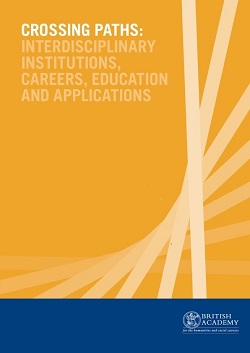
The project team from the Faculty of Science & Technology has received Higher Education Innovation Funding (HEIF) to undertake a series of activities aimed at encouraging university and the public sector to harness the benefits of advanced assistive technologies. (The HEIF project started last year and is due to finish at the end of July.)
The nature of HEIF funding encourages knowledge exchange and support to develop a broad range of knowledge based interactions between universities and colleges and the wider word, which result in economic and social benefit to the UK. In current clinical practices, urinary output measurement and supervision are prevailing medical intervention treatments for patients suffering from critical illness, aging bladder, post-surgery urination difficulties and long-term bedridden. However, the urinary output is still measured and monitored manually by healthcare staff, which is extremely time-consuming and prone to undesirable human errors commonly, arose in these repetitive and monotonous tasks. The project aims to invent an automatic device for remotely monitoring of urinary output, which features real-time remotely wireless catheter fall-off and flow rate monitoring, urinary output minute-by-minute monitoring and real-time states visualization.
The project team is made up of a number of researchers and students from multidisciplinary domains in addition to academics. The team (Prof Hongnian Yu, Mr Arif Reza Anwary; Mr Daniel Craven, Mr Muhammad Akbar, and Mr Pengcheng Liu) has recently presented their three developed prototypes at the collaborator’s site (Royal Bournemouth Hospital). The feedback and comments from the hospital staff are very positive. Dr Simon McLaughlin, the project collaborator from the Royal Bournemouth Hospital, said ‘The project looks to have progressed well. The work is excellent and the one of the prototypes is almost ready to deploy.’
The team hope to continue to consolidate the current developed prototypes and build on top of them to invent the commercially acceptable products.



 Eurostars supports international innovative projects led by research and development- performing small- and medium-sized enterprises (R&D-performing SMEs). With its bottom-up approach, Eurostars supports the development of rapidly marketable innovative products, processes and services that help improve the daily lives of people around the world. Eurostars has been carefully developed to meet the specific needs of SMEs. It is an ideal first step in international cooperation, enabling small businesses to combine and share expertise and benefit from working beyond national borders.
Eurostars supports international innovative projects led by research and development- performing small- and medium-sized enterprises (R&D-performing SMEs). With its bottom-up approach, Eurostars supports the development of rapidly marketable innovative products, processes and services that help improve the daily lives of people around the world. Eurostars has been carefully developed to meet the specific needs of SMEs. It is an ideal first step in international cooperation, enabling small businesses to combine and share expertise and benefit from working beyond national borders. With current events, it is important to keep up to date and UKRO are continuing to provide up to date information on all aspects of the UK’s access to EU funding. As a member of BU staff, you can received alerts, by signing up on the
With current events, it is important to keep up to date and UKRO are continuing to provide up to date information on all aspects of the UK’s access to EU funding. As a member of BU staff, you can received alerts, by signing up on the 



 The House of Commons’ Science and Technology Select Committee will today (13/7/16) hold an evidence session on the implications of Brexit for science and research. Jo Johnson will be appearing before the committee alongside Professor Philip Nelson of RCUK and several senior officials from BIS. Johnson has signalled his commitment to make Brexit work for universities, and has stated that ongoing projects such as Horizon 2020 should be carrying on as normal.
The House of Commons’ Science and Technology Select Committee will today (13/7/16) hold an evidence session on the implications of Brexit for science and research. Jo Johnson will be appearing before the committee alongside Professor Philip Nelson of RCUK and several senior officials from BIS. Johnson has signalled his commitment to make Brexit work for universities, and has stated that ongoing projects such as Horizon 2020 should be carrying on as normal. The British Academy has today
The British Academy has today 











 Dr. Ashraf cited on ‘Modest Fashion’ in The Guardian
Dr. Ashraf cited on ‘Modest Fashion’ in The Guardian NIHR-funded research launches website
NIHR-funded research launches website Academics write for newspaper in Nepal
Academics write for newspaper in Nepal New paper published on disability in women & girls
New paper published on disability in women & girls Global Consortium for Public Health Research 2025
Global Consortium for Public Health Research 2025 MSCA Postdoctoral Fellowships 2025 Call
MSCA Postdoctoral Fellowships 2025 Call ERC Advanced Grant 2025 Webinar
ERC Advanced Grant 2025 Webinar Horizon Europe Work Programme 2025 Published
Horizon Europe Work Programme 2025 Published Horizon Europe 2025 Work Programme pre-Published
Horizon Europe 2025 Work Programme pre-Published Update on UKRO services
Update on UKRO services European research project exploring use of ‘virtual twins’ to better manage metabolic associated fatty liver disease
European research project exploring use of ‘virtual twins’ to better manage metabolic associated fatty liver disease